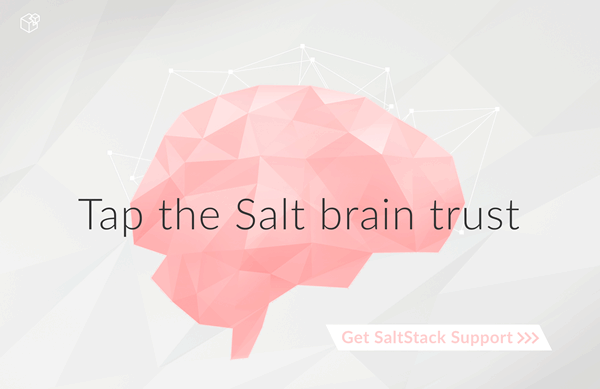Salt Cloud 0.8.3 Release Notes¶
Welcome to 0.8.3! While there are some new features, this release of Salt Cloud is primarily targeted at stability. Read on to see what's happened.
Documentation¶
The documentation for Salt Cloud can be found on Read the Docs: http://salt-cloud.readthedocs.org
Download¶
Salt Cloud can be downloaded and install via pypi or github:
https://pypi.python.org/packages/source/s/salt-cloud/salt-cloud-0.8.3.tar.gz
https://cloud.github.com/downloads/saltstack/salt-cloud/salt-cloud-0.8.3.tar.gz
Some packages have been made available for salt-cloud and more on on their way. Packages for Arch and FreeBSD are being made available thanks to the work of Christer Edwards, and packages for RHEL and Fedora are being created by Clint Savage. Package availability will be announced on the salt mailing list.
No Deploy¶
Salt Cloud was originally intended to spin up machines and deploy Salt on them, but several use cases have arisen in which this is not the appropriate action. For instance, when booting into new platforms which may not even support Salt just yet, it makes no sense to try and install a nonexistent package. In these instances, you can add the --no-deploy argument to the salt-cloud command to skip running the deploy script.
It is also possible to configure Salt Cloud to default to never deploying:
deploy: False
Firing Events¶
Salt Cloud is starting to make use of Salt's event system. If you are watching the event bus on the Salt Master, you can now watch for events to fire when minions are created or destroyed.
Start Actions¶
This is an experimental feature which some users may find handy. You may now configure a start_action for a deployed VM:
start_action: state.highstate
If configured, when the salt-cloud command runs the deploy script, it will open a subprocess to wait for the salt-minion service to start, and check in with the master (via the salt event bus). This feature does not currently work smoothly with all providers, particularly the ones which do not use "root" as the default login users. Your mileage will vary.
Exception Handling¶
There were a handful of spots in the code which would exit when an error occurred, sometimes without any meaningful error messages. This was was neither helpful to the user, nor Pythonic. Errors now should fire an exception of some sort, and if the error is Salt- or Salt Cloud-specific, a SaltException will be fired. This also helps pave the way for API usage of Salt Cloud.
Provider-Specific Actions¶
This is largely a programmatic addition at this point, which will continue to expand into userland. All providers supported by libcloud provide a minimum level of functionality that Salt Cloud takes advantage of. Most providers also include a number of "extra" functions which are non-standard. Some of these are critical in certain instances. For instance, most providers will shut down a VM for you when you send a destroy command, but Joyent requires you to manually shut it down first. This was previously only doable via their web interface. You may now pass a supported --action (or -a) to a cloud provider:
salt-cloud --action stop joyentvm1
All cloud providers support the destroy command via an action:
salt-cloud -a destroy mymachine1 mymachine2 mymachine2
Human-Readable States¶
Most of our cloud providers are accessed via libcloud, which provides a numerical code declaring the current state of the machine. This state is viewable via the various query options. Unfortunately, if you don't know what the codes mean, they're largely useless to you. Now, with the -Q or --query option, a human-readable state (i.e. RUNNING) will de displayed instead).
It should be noted that because some users are running salt-cloud via another script, the -F/--full-query and -S/--select-query options still return the numerical code.
Various other Features and Stability Fixes¶
The above features addressed many stability issues. Additionally, the following have been addressed.
Salt Cloud requires at least libcloud 0.11.4. If you are not running at least this version, an exception will be fired.
A certain amount of minion configuration is required for all VMs. If you fail to specify any, a (mostly empty) minion config will be created for you. The default master for this config will be "salt".
Previously, Joyent supported all Salt Cloud features without using Salt Cloud's own built-in deploy function. This is no longer the case, and so the Joyent module has been updated appropriately.
Some log settings where previously ignored. This has been fixed.
The Rackspace module previously would silently strip certain characters from a VM name. It now has a base set of characters that it will verify against, and raise an exception if an illegal character was specified. This functionality is also available for other cloud providers, but not currently set up for them.
AWS introduced a new region in Sydney. This region is not available in the latest official libcloud release, but if you happen to be running libcloud out of trunk, it will be supported by Salt Cloud.
Additional logging and PEP-8 fixes have also been applied. This should only affect developers.


